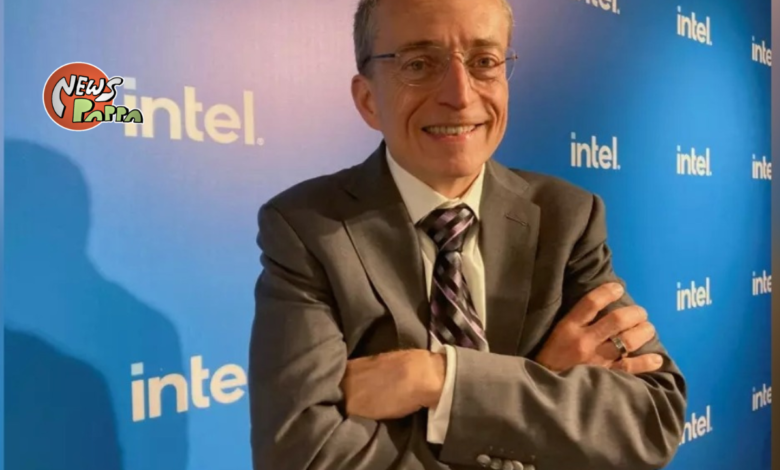Intel’s CEO gave his performance this score, saying the product was “at least no longer a bad machine.”

Intel’s CEO Pat Gelsinger Reflects on Progress:
Intel’s CEO, Pat Gelsinger, expressed that in the two and a half years since he took the reins at Intel, the company’s journey to regain its leading position in the semiconductor industry has seen some progress, albeit with room for improvement. In his own words, Gelsinger described their performance as “just passing.”
During an interview with Bloomberg News ahead of the inauguration of a new factory in Ireland on the 29th, Gelsinger remarked, “I would give us a passing grade for the two and a half years we have been on this journey. I would not say that my product machines are world-class, but at least it’s no longer a subpar machine.”
Gelsinger has been working diligently to guide Intel back to the forefront of the chip industry, reversing a trend of declining market share in recent years. Investors are now showing renewed confidence in Intel, with the company’s stock price having risen more than 1% on the 29th and posting a 35% gain for the year, closely trailing the 36.8% increase in the Philadelphia Semiconductor Index.
A critical part of Gelsinger’s strategy to restore Intel’s global prominence involves the construction of new manufacturing facilities. He has committed to establishing new factories in both Europe and the United States to meet the expected surge in chip demand.
This expansion aims to mitigate concerns about overreliance on East Asia, where geopolitical tensions linked to China have raised supply chain concerns.
Pat Gelsinger assumed leadership at Intel in 2021 after serving as the CEO of VMware, a major player in cloud computing technology, for nearly a decade.
He is determined not to repeat the missteps of past Intel CEOs that resulted in the company falling behind competitors like Taiwan Semiconductor Manufacturing Co. and Samsung Electronics Co. Notably, driven by the demand for artificial intelligence (AI), Intel’s competitor Nvidia has seen its market value exceed a trillion dollars.
Intel Faces Challenges in Recruiting for German Plant:
Intel’s plan to build a fab in Magdeburg, eastern Germany, has encountered a significant challenge in recruiting the necessary workforce. Although Intel intends to employ 3,000 individuals for the Magdeburg facility, a report from the Wall Street Journal reveals that only two trainees are currently participating in a local incubation program this year.
Intel’s production at the Magdeburg plant is slated to commence in 2027. The German federal government has been actively supporting Intel’s initiative, offering a substantial subsidy of 10 billion euros (equivalent to 10.59 billion U.S. dollars).
This project aligns with the European Union’s goal of bolstering chip manufacturing in Europe to compete with Asian semiconductor giants and doubling Europe’s global chip production share.
Nevertheless, semiconductor investment ventures like this one face numerous hurdles, including a shortage of skilled professionals and cumbersome bureaucratic processes.
High energy costs have also contributed to the stagnation of the German economy since the end of the previous year, with projections indicating a contraction this year.
To address the labor force requirements of the Magdeburg plant, Intel has established a three-year local training program, with the final year involving an internship at a factory in Ireland.
Both Intel and local authorities have acknowledged the shortage of local talent. Magdeburg, with a population of 240,000, lost a significant portion of its industrial base following German reunification in 1990.
Intel has set up an office in Magdeburg and launched a recruitment drive. The company’s representatives have been present at community festivals and have engaged with local officials. Intel is even considering sponsoring local football teams, as their branding can be found on the team jerseys.
Stefanie Klemmt, an official at the Chamber of Commerce overseeing vocational training in Magdeburg, disclosed that the first group of 20 trainees is scheduled to begin courses in August next year, with hopes of increasing this number tenfold eventually.
Jens Strackeljan, president of the nearby University of Magdeburg, announced plans to introduce an advanced semiconductor nanotechnology program this year and hire several full-time professors. Notably, two semiconductor technicians trained by Intel this year received their education at the University of Magdeburg.
Additionally, in eastern Germany, Taiwan Semiconductor Manufacturing Co. (TSMC) is poised to commence construction of a factory in Dresden in the latter half of 2024.
TSMC recently inked a “Semiconductor Talent Cultivation Program” agreement with Saxony and the Technical University of Dresden, focusing on fostering students through an exchange program. The first group of exchange students is slated to arrive in Taiwan in February 2024.
Ursula Staudinger, president of the Technical University of Dresden, affirmed that starting from spring 2024, the institution will arrange for approximately 50 students to study at Taiwanese universities for three months each year, followed by a three-month internship at TSMC to gain




